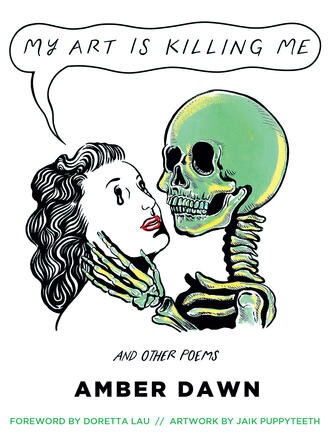Heather McCardell
Amber Dawn, My Art is Killing Me and Other Poems.
Vancouver: Arsenal Pulp Press, 2020. $17.95.
Amber Dawn’s latest poetry collection, My Art is Killing Me and Other Poems, speaks honestly about the toll that unapologetically creating art from trauma and life experience takes on its creator. It grows out of a response to her first collection, the autobiographical How Poetry Saved My Life (2013), and the consequences of speaking “your truth” (from the poem "Bootheel"). Delicately written, Dawn crafts an advocacy narrative around speaking up—rather than staying silent—in the face of trauma and violence, and how poetry aids in a searching reclamation of the body.
Dawn’s poetry is a visual work as much as it is a literary work, with use of softer grey type that becomes echoes against the inky black, creating a haunting voice that roams in the background of the poems. She uses plain and accessible language and is very precise with where words land on the page. What I adore most about this collection is the poet’s use of blank space, sometimes placing only a single line and leaving the rest of the page white. This creates the effect of giant pauses for readers to sink into and absorb the impact of her words, and literally creates silence that washes over us in juxtaposition to her writing on speaking up.
Dawn pulls readers into this collection and makes them part of her critique on institutions that enable violence and trauma against women, specifically through their silence, with these empty pages begging the question of readers, “Are you part of this silence, too?”
Part of the toll that My Art is Killing Me speaks to is the entitlement others feel to the creator’s body and time. In particular, “dear incorrect name” and “touch ≠ touch screen” are two poems within this collection that show how the story held within the body of the creator is treated like a given by the strangers around her: Event organizers asking for the story without compensation and a stream of Twitter messages asking for aid in their own healing. Yet even within the toll expressed in these pages, Dawn’s work continues to brave the literary scene and claim the creator’s body as her own. I find her mantra of “this is my body” in her ending poem, “the ringing bell,” absolutely delectable as the speaker continues to assert her autonomy. The “this is my body,” coupled with the question of whether poetry can also continue to help reclaim the body, ends this collection on that question.
While the “I” seems unsure if poetry can continue to reclaim, as a reader I find reclamation within every crevice and rounded letter. This is a collection that is empowering even amidst the hard-to-swallow truths, and Amber Dawn treats her challenge of the overwhelming silence with care, research, and courage. This is a book that lives with me now, and I rejoice to return to its pages that suck me in like a bee to sweet honey.
HEATHER MCCARDELL
is a graduate student at the University of Windsor, completing her MA in English Literature and Creative Writing. Her poetry has appeared in Transit Windsor bus ads as part of the City of Windsor’s Resilient Voices Initiative to bring hope and inspiration to the community. When not writing essays, McCardell enjoys hiking, writing poetry, and sitting outside with a good book.


